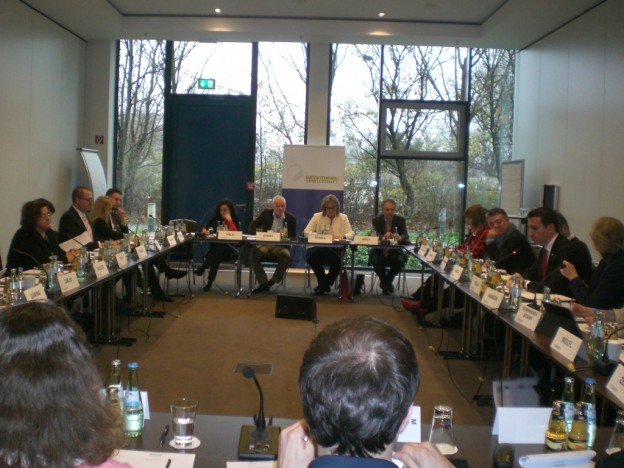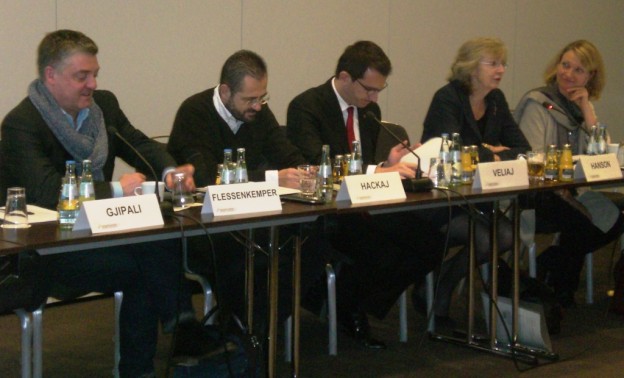 On 4-5/12/14 a group of civil society activists from Albania – journalists, academics and international stakeholders – met in Munich at a workshop organised by the Sudosteuropa-Gesellschaft. They held a dialogue on Albania and its future, looking for answers to the current issues surrounding Albania’s civic society and finding more questions, as outlined by Joanna Hanson. The event participants expressed the wish to continue this discussion: contributions are welcome as comments to this post.
On 4-5/12/14 a group of civil society activists from Albania – journalists, academics and international stakeholders – met in Munich at a workshop organised by the Sudosteuropa-Gesellschaft. They held a dialogue on Albania and its future, looking for answers to the current issues surrounding Albania’s civic society and finding more questions, as outlined by Joanna Hanson. The event participants expressed the wish to continue this discussion: contributions are welcome as comments to this post.

The problems that persistently came up in the workshop, whatever the context, were those of EU membership, corruption, the rule of law, the need for reform, the perceived Albanian nationalism and economic development. There were useful exchanges on the substance of all of these issues, but I would like to comment rather on the civic society aspects of the discussion.
The discussions repeatedly led to questions about the language and narrative used by civil society, how the latter adopts narratives and does not change them. The clichéd phrase ‘painful reforms’ was often repeated in relation to the reforms required for EU accession. The language was contested because these reforms are in fact for Albania’s good, a country which also has the experience of thirteen other member states to draw on and adapt. But was not this ‘pain’ more related to the domestic adjustment of the political elites, some of whom do not want to embrace a rule of law structure, which will impact on their alleged unacceptable practices? These reforms may be complex and difficult at times, but they should be explained and sold to the public as transforming their lives for the better. Problems should rather be seen as transitory. Using such negative descriptions only serves to alienate rather than encourage support for this developing democracy, which more than once during the discussions was described as an “autocratic liberal-democracy”.
Moreover, there was continual reference to the concept of critical thinking and the need to think outside the box, making use of creative language. This is where civil society has a specific role and needs not only to think about how these conversations should be held, but to take a provocative lead. It was agreed that civil society’s role was about opening difficult issues, providing relevant information and asking challenging questions and thus changing the narrative. Civil society, albeit non-existent in Albania before 1991, has gone through a process of changing perceptions regarding itself. The donor factor has generated deep levels of mistrust. It is seen very much as a Tirana creation and hence a problem of centrality and the elites who function within that centre. There needs to be a break with this, along with a move towards greater local action. A feeling of greater citizenship needs to be developed. Civil society needs to build that citizenship and feeling of a society of neighbours and fellow human beings.
This critical thinking issue also feeds into the lack of trust amongst the institutions, the elites, and the people. Civil society was seen and described as being split along parallel lines with the politics. The EU was seen as not having done much to enhance the public’s trust in the institutions and also as being unaccountable. Civil society needed to think about how to build trust both within itself, as well as in the institutions. These issues of trust were linked to the lack of ownership of the EU process. Albania’s role in the region has changed because of pressure from outside not from the inside. The donor factor in civil society was described as having created deep mistrust.
The problem of the two levels of discourse, one for the domestic audience and one for the externals, was seen as a real issue.
On the governmental level, PM Rama’s cabinet was described as having an open-door policy which meant greater inclusiveness of civil society. This was argued despite the cited practice of closed-door policymaking and lack of formal channels. The cabinet had consulted trade unions and employers associations, the church, so arguably the notion of civil society had been expanded beyond think tanks. Nevertheless, concern was expressed about the unproductive relationship between the government, local and central, and civil society. Professional groups were not independent so business was not playing its civil society role. Thinking about ways of overcoming the political parties’ domination over the state and civil society was one of the objectives of the workshop, as well as taking into account the extent to which civil society paralleled the two political sides. This was a key issue which was not given enough discussion, although it was acknowledged that CSOs should network more and not compete.
Greater foreign involvement was seen as being needed and not only donor support. More support was needed for communities and investment in infrastructure.
The EU also should be more accountable, in particular its elites due to their failures. There was also strong criticism of EU’s approach, which puts stability before democracy, thereby favouring strong leaders whose power does not necessarily derive from their democratic credentials. This disenfranchises the developing civil society and arguably restricts the space and time needed for its evolution.

The problem of civil society’s ineffective public policy information was also addressed. Think tanks and others need to draw up analysis which is comprehensible for all. This also fed into discussions about civil society’s interaction with the media and the latter’s own fourth estate role.
Attitudes towards the Albanian state and how they impacted on civil society were mentioned a few times. The public generally regard the state as weak, because it cannot deliver, but also as omnipotent because of abuse. The recent demolition of ‘informal construction’, however, was mentioned as being the first time that people saw their state being effective and hence attitudes might be changing. There is a strong culture or rather habit of the public deferring greater ownership to the state, or the family network, and not to themselves. This was seen in a specific context where civil society’s ability to find its own space becomes more complicated.
A valuable discussion, which needed further development, took place in one of the sessions, devoted specifically to the economy, environment and education. It was the environment which claimed most of the time both as an economic as well as a green issue. There was surprise shown that Albania, together with the rest of the region, did not put more investment into alternative energy both as a niche product, as well as a job- generating one. This was seen as an area where civil society, think tanks, could do analysis to provide arguments and data, discussing these options. Wildlife conservation was seen not only as an end in itself, but also as feeding into tourism and hence revenue creation. .
At the end of all the discussions I was left with the impression that civil society in Albania had some highly dedicated and skilled activists who were good at coming up with ideas and providing valuable information and analysis. Civil society has the resources to contribute answers to Albania’s questions, but it also knows that this is not being done effectively. Activity needs to be more focused and independent in order to provide bold solutions and better practices. It needs to think about greater coherence and joined up action, about over-riding structures and strategies. This is as much at grass-roots, community and central level. Likewise, it would be good to think simultaneously about how to convey its ideas to a much wider public. The discussions did not really answer these questions, but time was limited and I hope that it can continue below.
Note: This article gives the views of the authors, and not the position of LSEE Research on South Eastern Europe, nor of the London School of Economics.
___________________________
Dr Joanna Hanson is Visiting Fellow at LSEE Research on South Eastern Europe, London School of Economics (LSE). Dr Hanson is now concentrating her efforts on research on and activism in civil society in the southern Balkans and researching Anglo-Polish relations during the Solidarity period.


